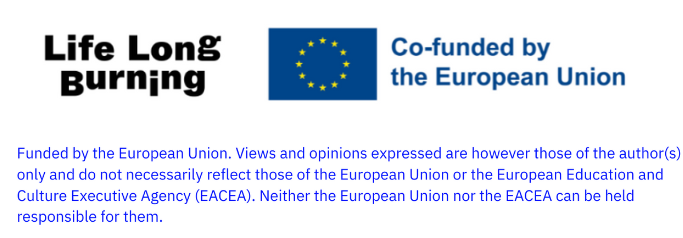
Soup Talk Panel returns to Moving in November, again drawing connections and discussing between the educational and professional realities of contemporary dance and performance. This year’s theme is Enduring pathways: contemporary dance education today and tomorrow.
In this panel discussion MA dance programs from Helsinki, Oslo and Vilnius gather to discuss topics of educational and professional development in the field of contemporary dance. As a starting point, the discussion dives into dialogue with the Moving in November’s artistic director Kerstin Schroth’s Pre-note, which ponders about the possibilities to grow something delicate, fragile and enduring in an unstable environment.
In times where the boundaries between disciplines are constantly shifting and broadening, and the demands on dancers as creators, performers, and thinkers continue to evolve, institutions of higher learning are challenged to remain relevant, responsive, and visionary–enduring. The panel conversation invites the participants and the audience to think together how educational programs and pedagogical approaches are adapting to meet the complex realities of contemporary dance practices today, in relation to and in dialogue with international dance festivals such as Moving in November.
The panel of artists, educators and dance students will reflect on the pathways that prepare dance artists to perform, to question, to lead and develop their art. The aim of the discussion is not only to reflect on the existing models of dance education but also to take the gathering as a chance to imagine new, delicate possibilities across the educational programs and professional dance fields.
This panel talk is a part of the Focus on the Local Landscape within the frame of Moving in November.
Benjamin Pohlig is a choreographer, dancer and researcher originally from Berlin. He studied contemporary dance both in England and Belgium. In his choreographic work, he explores the theatre as agora, a place in which social and political behaviours are not only practised, but are also experienced physically. This concept appears across his works, including the participatory solo dance yourself clean, and his collaborations 5 seasons and A Farewell to Flesh. As a dancer, he has worked internationally with amongst others Martin Nachbar and Isabelle Schad. From 2019 to 2022 was he an ensemble member of Cullberg. He is currently a PhD fellow at KHiO where he investigates the relationship between dance and protest.
Eeva Muilu is a choreographer, dancer, and professor in dance at Uniarts Helsinki, where she leads the MA Programme in Dance Performance. Her choreographic works range from solos to large group pieces, including collaborations with professional dancers, actors, and non-professional performers from diverse backgrounds. Her works have been presented in Finland and internationally at venues and festivals such as Zodiak – Center for New Dance, Helsinki Festival, Moving in November, ImPulsTanz, and Tokyo Dance Triennale. As a dancer, Muilu has worked with choreographers such as Jefta van Dinther, Maija Hirvanen, Thomas Lehmen, and Ervi Sirén. She has taught widely, been part of the curatorial team of the Side Step Festival and served on various boards in the field of dance. Her work has been recognized with awards such as Prix du Jardin (2012) and the Critics’ Spurs Award (2008). Muilu holds an MA in Dance from the Theatre Academy’s choreography programme at Uniarts Helsinki and has also studied at SNDO at the Amsterdam University of the Arts.
Laura Linna is a dancer based between Helsinki and Stockholm. She is currently part of the Master’s Programme in Dance Performance at the University of the Arts Helsinki. Recently, their work has been busy with questions surrounding perception and being seen, as well as the frictions and slippages that emerge from the performer’s position. As a dancer, she has collaborated with choreographers and artists including Ofelia Jarl Ortega, Yared Tilahun Cederlund, Liz Kinoshita, Gergő D. Farkas, QUARTO, Goosebumps Scenkonst, and Dance Theatre MD. Since 2023, they have also been part of the production team for several projects with the feminist art community UrbanApa. Laura holds a BFA in Dance Performance from Stockholm University of the Arts (2023) .
Maia Means (DK/NO) is a dancer and choreographer based in Stockholm who creates performances and publications that explore collaborative structures, choreographic writing and shifting bodily states. She has performed for among others Sindri Runudde, Björn Säfsten, Mette Ingvartsen and Lisen Ellard, and she works closely with Oda Brekke and Max Wallmeier. She is currently doing an MA in Dance at KHiO in Oslo.
Martyna Grinevskė is a dance artist who graduated from the Lithuanian Academy of Music and Theatre with a Bachelor’s degree in Dance Art in 2021 and is currently continuing her studies at the master’s level. In her artistic practice, she explores the relationship between body, memory, and technology, investigating forgetfulness as a creative process and the experiences of bodily dissociation and rebirth. Her work weaves together movement, sound, and space, seeking ways in which the body becomes a vessel of memory and forgetting transforms into a mode of creation. Together with Estonian artist Triin Kauber, she forms the duo CrySis (Crying Sisters / Crisis), which examines crying as both a technological and emotional experience – a bodily ritual and a gesture of togetherness. In September 2025, during the Art Actions Week ’25 in Vilnius, Martyna and Triin presented the artistic action CrySis.
Miklós (Miki) Ambrózy (he/him) is a Vilnius-based researcher, writer, and artist working with film. He is an active member of the Why Cut When You Can Fade artistic research group, founder of the platform Landing, and a member of the artist-run film lab SPONGĖ. His research topics include degrowth, pollution, film poetics, and the transfer of artistic methods to the broader public. He is currently employed as artistic researcher at Vilnius Academy of Arts. Miki has studied Audiovisual Arts and Film Directing in LUCA School of Arts, Brussels, and acting for stage at the Thessaloniki Centre for Experimental Theatre. Miki’s films and installations have screened in Brussels, Paris, Vienna, Vilnius, Riga, Manchester and Athens.
Torunn Helene Robstad (NO/US) is a professor and head of the Master’s programme in Dance at Oslo National Academy of the Arts (KHiO). Robstad received her training at the Norwegian Opera Ballet School in Oslo and the Alvin Ailey School in the United States. She has worked with both institutional and independent companies, including Carte Blanche and the Cullberg Ballet, and has performed in works by choreographers such as Mats Ek, Carolyn Carlson, Rui Horta, Tere O’Connor, Ina Christel Johannessen, Ingun Bjørnsgaard, Anzu Furukawa, and Janne-Camilla Lyster. Her professional experience includes work as a performer, choreographer, and rehearsal director at the Norwegian Opera and Ballet, as well as contributions to various theatre productions in Oslo.
Simo Kellokumpu is a Helsinki-based choreographer and researcher working across choreography, performing, and contemporary art. His practice explores the transdisciplinary interplay between bodies, movement, and space, influenced by post-internet reading practices, AI research, speculative fiction, and site-responsiveness. Alongside his solo projects, he collaborates with other artists. Kellokumpu earned his Doctor of Arts degree in 2019 from the Theatre Academy, University of the Arts Helsinki, with the project Choreography as Reading Practice and concluded his postdoctoral project xeno/exo/astro-choreoreadings in 2025. In addition to his artistic work, Kellokumpu works as a lecturer in the MA in Dance Performance program at the Theatre Academy, Uniarts Helsinki and as a curator-facilitator at Hakaniemenranta 26 – Työhuone art space in Helsinki.
Venue
Caisa, Kaikukatu 4B, 00530 Helsinki
Time
14.11.2025 12.00Tickets
Duration: 1h 30min
Participants: Benjamin Pholig, Eeva Muilu, Laura Linna, Maia Means, Martyna Grinevskė, Miklós Ambrózy, Torunn Helene Robstad
Host: Simo Kellokumpu
Photo: Kerstin Schroth
In collaboration with: Caisa, the University of the Arts Helsinki/ Theatre Academy /Master’s Degree Program in Dance
Soup Talks are organized by Moving in November within the frame of European Network Project Life Long Burning – Futures Lost and Found, funded by Creative Europe 2023-2026.


